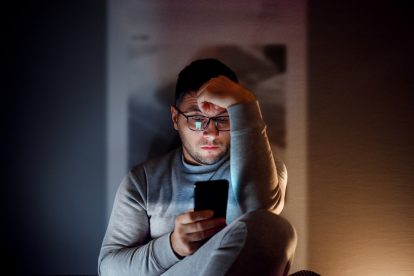The Effects of Cyberbullying on Social Anxiety and the Need for Compassionate Treatment

The anonymity of the internet presents opportunities for harmful cyberbullying among teens, but there is also a growing number of adult victims of cyberbullying. When this act exacerbates or triggers social anxiety, specialized, compassionate treatment can help people heal from cyberbullying and social anxiety in a safe environment.
The advent of the internet has, in many ways, been a blessing for people with social anxiety disorder. The online landscape presents opportunities for connection without many of the triggers sparked by in-person interactions, allowing countless people to feel a sense of safety and comfort through social media.
But there is another side to social media and social anxiety disorder; for some, social media becomes a source of severe distress that aggravates pre-existing anxiety or causes anxiety to emerge. This is particularly true when cyberbullying enters the picture.
Cyberbullying Amongst Teens
In recent years, cyberbullying amongst children and adolescents has made headlines across the globe due to a number of high-profile suicides, rape porn, and revenge porn. Indeed, cyberbullying appears to disproportionately affect teenagers, creating a perfect storm for social anxiety to take hold. As a writer for HealthBoards points out, the teenage years are“a time in which kids become self-conscious and are at greater risk of suffering long-term effects of negative comments or embarrassing situations.” The very qualities that make online spaces so inviting to many with social anxiety – anonymity, release from established social norms, and perceived low-stakes participation – can create an environment in which you are more likely to experience negative social consequences. “Because interactions occur behind a cyber curtain, teens often say things they wouldn’t to someone’s face, which can increase occurrences of teasing, bullying and humiliation, all of which can lead the victim to develop social anxiety.” Research indicates that 58% of kids have been victims of cyberbullying, and 53% admit to engaging in socially aggressive behaviors online.
The effects of these behaviors can be long-lasting, impacting the way people experience themselves and interact with others long after the cyberbullying has stopped. The augmented emotional vulnerability we have in adolescence means that these formative experiences can create the blueprint that shapes your understanding of yourself and the world around you for years to come. Cyberbullying can strip you of your sense of worth and security, leaving you fearful of others and reluctant to participate in both online and in-person social situations.
Begin Your Recovery Journey.
877-727-4343Adult Victims of Cyberbullying
Teens, however, aren’t the only ones who experience cyberbullying, as vividly demonstrated by recent celebrity hacking scandals and the ongoing Gamergate campaign to silence prominent female critics of video games. According to a survey conducted by the Pew Research Center, almost 75% of adults in the United States have witnessed online harassment and 40% have been victims themselves. Harassment included everything from being called offensive names to being physically threatened or stalked. As Barbara Ortutay of The Associate Press writes:
Young adults—people 18 to 29—were the most likely age group to see and undergo online harassment. Women ages 18 to 24 were disproportionately the victims of stalking and sexual harassment, according to the survey. And people who have more information available about themselves online, work in the tech industry or promote themselves on the Internet, were also more likely to be harassed.
While most people knew their harassers, “around 40% said a stranger was responsible, with 26% saying they didn’t know the real identity of the person or people involved.”
Of course, not everyone responds to cyberbullying in the same way; the Pew report revealed that 22% of of adult victims did not find their most recent incident of harassment upsetting at all. However, for 14% of people, cyberbullying was “extremely upsetting,” leading to significant emotional distress and, for some, initiating or aggravating social anxiety as they internalize insulting messages, develop a deeper fear of social interactions, and experience damage to their already fragile ability to trust others. This may be particularly destructive for those who have previously used the internet as a safe space for forging social connections; by invading what you assumed was a place of solace, cyberbullies confirm your worst fears: that nowhere is safe and people mean you harm. Family internet expert Sue Scheff writes:
Cyberbullying allows cruelty at all ages to play out in a 24-7 arena. I have felt, and survived, the pain of being a victim of adult cyberbullying. We always hear about how brutal children can be, but if you consider ‘toddler bashing’ mothers, Richie Incognito, as well as certain workplace superiors you will soon realize that plenty of adults are downright malicious. Your keyboard can be used as a lethal weapon today, and sadly more adults have caught on.
The damage caused by such harassment can profoundly affect your ability to engage in everyday social and professional situations, leaving you without the vital support networks that nourish emotional health and vulnerable to self-destructive behaviors. In extreme cases, you may avoid social interaction as much as possible, self-isolating as a defense mechanism to protect yourself against future harm.
Call for a Free Confidential Assessment.
877-727-4343Healing from Cyberbullying and Social Anxiety
Seeking mental health treatment is often extremely difficult for people struggling with social anxiety, as treatment itself inherently requires contact with others. This can be particularly intimidating if you have been the victim of cyberbullying and have seen many of your fears materialize in your lived experience. However, treatment is the best way to overcome the painful emotions and dysfunctional behaviors associated with the condition and find true healing from the distress of cyberbullying.
If you are struggling with social anxiety disorder, it is imperative that you choose a treatment program in which you feel safe and comfortable enough to engage in the therapeutic process, however difficult it may first appear. At Bridges to Recovery, each of our facilities is limited to a maximum of only six clients at a time to foster a warm, intimate environment in which you feel welcomed and secure. Using a comprehensive range of therapeutic modalities, your clinical team will design a personalized treatment plan based on your unique circumstances that allows you to draw on your strengths to address the struggles you are facing. With the guidance of compassionate clinicians and supportive peers, you can come to more fully understand the roots of your anxiety, your triggers, and the way social anxiety and cyberbullying have impacted your life, while simultaneously developing strategies for regaining emotional health. All therapies can be modified to meet your individual needs to ensure that you are able to actively participate in treatment in a way that feels right for you. We also engage you through a process of thoughtful aftercare planning to ensure that the gains you have made in treatment are preserved when you return to your home environment.
Cyberbullying may be an unfortunate fact of modern life, but social anxiety disorder doesn’t have to be part of yours. With the right care, you can overcome your fears, regain your confidence, and create a richer, more fulfilling life.
Bridges to Recovery offers comprehensive treatment for people struggling with social anxiety disorder as well as other mental health disorders. Contact us for more information about how we can help you or your loved one start the journey toward lasting wellness.
Image Source: Pexels user Karolina Grabowska






